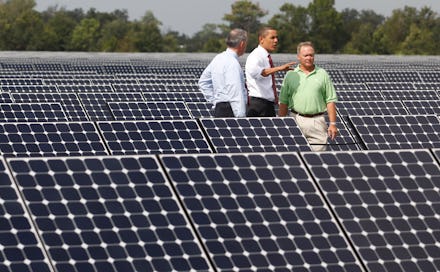

Like anything in Florida politics, the stakes are high for this year's controversial vote on a solar power initiative.
On one side, a group backed by large energy companies has pushed a state constitutional amendment known as Amendment 1 that it claims will protect the rights of Floridians to solar power. But numerous opponents argue the proposal is a ruse by fossil fuel companies to box out renewable energy.
Despite its name, the Sunshine State is not America's solar leader. The state has the third highest "solar potential" but ranks fourteenth nationally for installed solar capacity. President Barack Obama has pushed for an increase in renewable energy, notably in Florida. He visited southwest Florida in 2009 to make an early pitch for using federal stimulus dollars to develop solar power.
In 2016, there are more than 450 companies providing solar power throughout Florida. And the state is expected to dramatically increase solar production in the next several years.
Whether solar use increases in Florida is where a contentious November vote comes into play.
In 2015, solar power proponents hoped to gather enough signatures for a Florida ballot measure they said would increase access to cheaper solar energy. Floridians for Solar Choice — a group backed by the state's solar power companies — wanted to open Florida's solar market up to out-of-state competition.
Another group, Consumers for Smart Solar, opposed that proposal and won the battle to place their measure on the 2016 general election ballot. Known as Amendment 1, this fossil fuel-backed group argues their proposal enshrines a right to solar power in the Florida constitution. But others argue the measure is deceptive and will allow energy companies to financially punish consumers who install solar.
KERRY SHERIDAN/Getty ImagesConsumers for Smart Solar say Amendment 1 will give Floridians a constitutional right to install solar panels. And it will "protect consumers" because it will keep people who choose not to install solar from subsidizing those who do.
This group argues the latter protection is necessary because people who use solar can cost their neighbors who do not use solar. But many groups take issue with the argument there is a need to protect non-solar users.
Earlier this year, attorneys for the group EarthJustice advised the state that the amendment "would be a constitutional endorsement of the idea that rooftop solar users should pay higher utility bills than other customers." Opponents of Amendment 1 say there is no evidence that users of solar cost the electric grid money. "Nowhere in the U.S. is grid-tied, net-metered solar power threatening any utility or power network," wrote Neville Williams, a solar entrepreneur, in the Naples Daily News in June.
Opponents of the amendment believe the real motivation behind Consumers for Smart Solar is halting solar power growth in Florida. As a February Rolling Stone exposé on how the Koch brothers are blocking solar growth in Florida explained, solar power poses a threat to the centralized profit formula for power companies.
"This amendment is clearly designed to protect the utilities from competition and to limit solar options for the citizens for Florida," the owner of a Florida solar installation company wrote in the Gainesville Sun in April. "It would hurt solar."